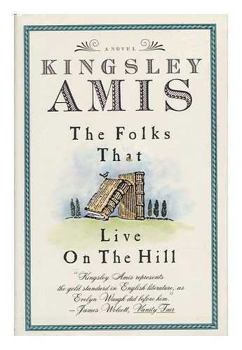The Folks That Live on the Hill
Select Format
Select Condition 
Book Overview
Harry Caldecote is the most charming man you'll ever meet, a convivial academic who devotes his life to others. He is on call when his alcoholic niece falls into strange hands, when his brother... This description may be from another edition of this product.
Format:Hardcover
Language:English
ISBN:0671708163
ISBN13:9780671708160
Release Date:January 1990
Publisher:Summit Books
Length:246 Pages
Weight:0.99 lbs.
Customer Reviews
2 ratings
Desultory, but nonetheless memorable
Published by Thriftbooks.com User , 14 years ago
I've just re-read what has over the years become my favorite Kingsley Amis novel, and am again struck by these characters: the absent-minded Harry Caldecotte (whose insights occasionally roused him to action), the dominant lesbian and her malice, her ingenue partner and her ingenue-ness (their differences preventing genuine companionship), the statuslessness of the ingenue's ex-husband, and the lifelike quality of every last individual among the rest. It seems that I've met all these people, where was it? Cambridge, Mass? Chicago? Maybe I actually saw them on the streets in London, though how could I have known? I was only there for a month and knew no one. Yet they are now part of my memory of Primrose Hill, even more vivid than my memory of the view toward central London. The articulate and perceptive reviewer of January 2001 refers, justifiably, to "a thin and hard-to-follow plot" and remarks, again with reason, that "Harry Caldecote, the main character, is fairly well developed but the many others appear and disappear with uncomfortable regularity". But isn't this characteristic of our own lives? It's true that the elder Amis concocted some striking plots in his day ("That peculiar feeling" and the "Anti-death league" come to my mind), and that "Folks that live on the hill" has almost no plot, other than the plot that arises from the mere affections and disaffections of the characters, but how many of us live in a plot? And isn't it true that most of the characters we've known have appeared and disappeared, without much regard for how we felt about it? Isn't that life? Kingsley Amis has always struck me as an intensely realistic writer, the best creator of character in English literature since Shakespeare, rather than a clever master of clever plots. The girl-chasing wears out after a chapter or two, and you have to be in the mood for the drinking stories. His scenes of repartee, for all their sharpness of wit, are no more realistic than the trivial rubbish on American television. Unlike the latter, however, this call-and-response is based on genuine insight into real people; they are the l'esprit de l'escalier we didn't say, even when the fools and berks and nobs who provoked them were still in the stairwell with when we thought of them. For old Amis was a humane and kind-hearted man, for all of his sarcasm, and it's hard to imagine him actually hurling all those barbs, even when the targets were as irritating as he painted them. I find that I've written a testimonial to the late Amis rather than a review of the book at hand, but let it stand. Let the old sceptic rest in whatever peace may be out there for a man with so little belief in anything other than his annoying but nonetheless lovable fellow man.
Hazards and haplessness in a London neighborhood
Published by Thriftbooks.com User , 22 years ago
I picked up this novel with a preconceived notion about what I would find. After all, I had read the maverick son's works and assumed that their dark, contemporary atmosphere was a reaction to the father's stalwart British character. Consequently, just from the title alone, I gleaned an image of the happy goings-on of a small, gregarious community who might meet for tea and air their church-oriented disagreements at the local garden sale, tra la, tra la. NO WAY. The writing is immediately engaging, especially the dialog which moves fasts and twists sharply. Nothing is what it seems. No one is content. Everyone is getting on with their daily business while covering a deeply discordant nature. The most dramatic example of this desolate irony is when the three very adult children take a taxi to lunch with their aged mother still living nearby where they grew up. It's an awful afternoon: no wants to be there, they don't enjoy each other's company; everyone participates in the charade of a happy family gathering. The author's voice is terribly, that is, fiercely, strong in his cynical and ironic commentary on these people. It is sometimes droll but never funny. In sum, the major characters are trapped in and dependent upon the machinations of their humdrum, small everyday lives. It's delightful writing in a very tough, nearly hideous story. There are wonderful and often scathing depictions: the widow Clare and the cumbersome dog left behind by her late husband, the desperate alcoholic Fiona, the bit-on-the-side Maureen and, most memorably, the more-English-than-the-English Pakistani shopkeepers. Just when I thought the whole things was going to end disastrously, these people are all gathered in the neighborhood pub (but of course, where else?) and accept or resolve their differences while Amis's authorial voice becomes almost paternal and loving. It worked for me: I heartily enjoyed this story with its fussy weave of banal hazards and haplessness, and its finely tuned emotional climax when Harry decides not to accept a promising job in the USA because he and his sister Clare, quite simply, need each other.




